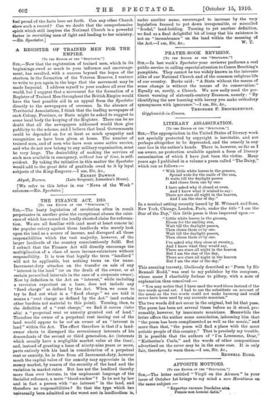APPOSITE MOTTOES.
[To THE EDITOR OF THE "SPECTATOR."]
Sut.,—The letter entitled "Virgil on the Airmen" in your issue of October 1st brings to my mind a sors Horatiana on the same subject :—
" Expertus vacuum Daedalus Mr& Fermis non homini datis."
It is noteworthy that this famous ode gives prominence to the objection which narrow theologians in all ages have raised against great inventions,—namely, that we should not seek to alter and, as it were, to stultify Creation, lest haply we be found to fight against God. Some of us are old enough to remember the outcry against the use of anaesthetics (especially in childbirth); and even now aeronauts are occasionally warned that men may disport themselves on sea and on land, but not in the sky,—Coelunt ipsum petimus stultitid. (Perhaps the best illustration of this argument is furnished by Hero- dotus, who relates that a Greek colony on an isthmus sought to protect themselves against the Persians by turning their isthmus into an island; but the oracle forbade them, "for Zeus would have made it an island if he had wished.") But my present concern is with adapted and adaptable quotations. Known to a few, probably very few, of my readers is Swift's witty exclamation when a mantle unluckily upset a violin,—Mantua voe 9niserae nimium vicina Cremonae. But if the first rank must be given to this example, other adaptations may in a manner follow as its train-bearers. I know not whether any photographer has taken as his motto, Solem guis dicere falsum Audeat.—Horace tells how the penitent Europa was cheered by the assurance that a part of the- world should bear her name (Tua sectus orbis Nomina clued). Should not this turn one's thoughts to the discoveries of Columbus and to the bewildering freak of destiny which has immortalised Amerigo P—In days when a rudimentary spirit- lamp was inauspiciously called an etna, an explosion in one of them tempted me to exclaim : " Vidinius undantem ruptis fornacibus Aetnam." From this bathos of comparison, this veritable jluctus in simpulo, I pass on to a more serious example. Shelley in his fine translation of Goethe's " Pro- logue in Heaven" says of storms, notably thunderstorms, that they "Weave a chain of power
Which girds the earth as with a band."
If such a metaphor can be used of what may be called electricity run riot in lightning, has it not now a more literal application to electricity organised and, let me say, domesti- cated in the telegraph P—I am, Sir, &c,
LIONEL A. TOLLEMACHE.
Athenzum Club, Pall Mall, S. W.















































 Previous page
Previous page